

Pilot: Darrell Bash | Nickname: none | Rank: Lt. | Squadron: 462th | Plane: 616 | Name: Shanghi Lil | S/N: 472588
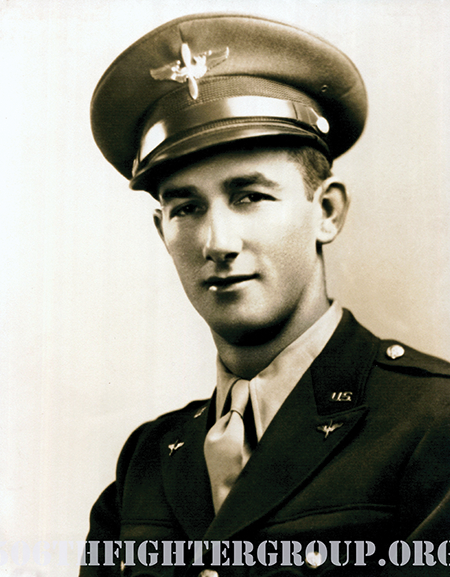
On the 10th of June, 22 aircraft of the 462nd completed an escort mission to the Tokyo area, the squadron providing our bombers with top cover. A Japanese squadron of Tonys, lying in wait for the bombers, was engaged by the 462nd . Major DeJarnette, Captain Lee, Lts Bash and Rosebrough each scored one aerial kill with no loss to our squadron.
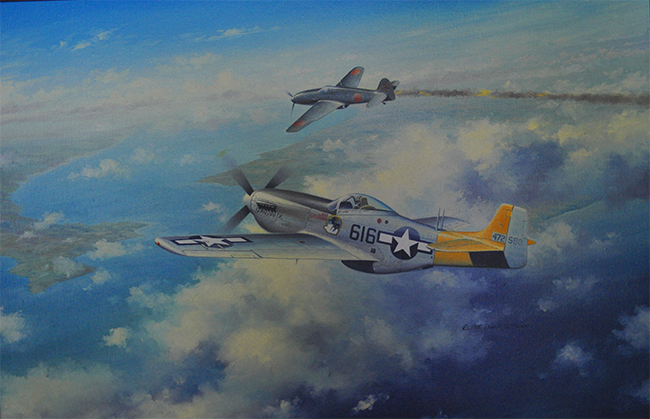
“On a B-29 escort mission, we encountered enemy fighters at 25,000 feet which resulted in several minutes of intense fighter combat action. My part in the scenario was the destruction of one enemy fighter (Tony) and inflicting damage on another one. I gave chase (hot pursuit) of the damaged aircraft fighter. I was separated from my flight leader (DeJarnette) and also my wingman, who couldn’t keep up with me, due to an un-jettisoned fuel drop tank.

actual name tag from flight jacket
“On a B-29 escort mission, we encountered enemy fighters at 25,000 feet which resulted in several minutes of intense fighter combat action. My part in the scenario was the destruction of one enemy fighter (Tony) and inflicting damage on another one. I gave chase (hot pursuit) of the damaged aircraft fighter. I was separated from my flight leader (DeJarnette) and also my wingman, who couldn’t keep up with me, due to an un-jettisoned fuel drop tank. My return to realism was to note my position at 4,000 feet over a Yokohama airport, which was the destination of the Japanese fighter I had been chasing. At this time, I heard my flight leader calling for my position; I answered, but got no response. I was getting very lonely being separated from the squadron, my flight leader and my wingman! My last aircraft gun burst was from two outboard guns, which indicated minimum ammunition, left. It was BTTW [balls to the wall] at this point. The U.D. homer assisted me to the B-29 rendezvous point…the squadron had already departed for Iwo Jima. I joined the next B-29 departing for home base and arrived safely with no further problem.”
Born on Oct 28, 1921 in Findlay, Ohio. Migrated to Los Angeles, California during the depression. Graduated from Compton High School in Jun 1939 ll
Darrell’s favorite pastime was “dancing with the ladies”, his favorite sport was swimming, and he was Captain of the Compton High School Crew Team. He worked many jobs to help the family during the depression (newspaper boy, junk trader, etc.) After high school he became a ship fitter at the California Shipyard and was taking accounting classes at USC when he was drafted in 1942 into the Army. He was inducted into the Army at Ft Arthur, CA and went then Jefferson Barracks, MO (Sep-Nov, 1942), for Basic Infantry Training. He then went to the classification Center Nashville, TN and was graded as suitable to be a pilot (Nov 42-Jan 43). From there he went to Maxwell Fld, AL for Pre-flight (Jan-Apr, 1943). He was a good mechanic as he had plenty of practice working on his old Ford (he later became an A&P mechanic after he retired from the USAF). His mechanic skills helped him get through Aviation Pre-flight, which had a heavy focus on aircraft engine repair. He said he was motived to do well as his classmates who washed out of Preflight and returned to the regular Army as Privates wrote him from Europe to tell him to do everything he could to make it through!
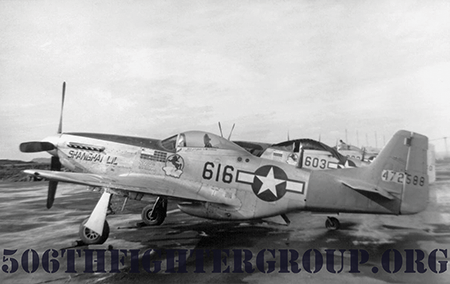
462nd SQD 616 Shanghi Lil
Darrell next went to Ocala, FL for Primary Flt Training (Apr-May 43) in Stearman PT-17s, Class 43I. He soloed on April 22, 1943 after 11 flights. Basic flying at Gunter Field, AL (Jun-Jul 43) was next where he flew the BT-13 Vultee. Advanced flight training was at Marianna, FL (Aug-Oct 42) flying AT-6s where he received his pilot wings (243.5 flying hours) and 2Lt commission on Oct 1, 1943. Next, Darrell went to Tallahassee FL Oct 43-Jan 44 for Replacement Training Unit (RTU) training flying the P-47 to learn formation, aerial and ground gunnery, high altitude combat, and acrobatics. On Jan 10, 1944 he was appointed as an instructor in the P-47 at Tallahassee FL. His instructor duties delayed his assignment to actively fight in the war, which would have been in Europe at that time.
After Darrell graduated with his wings and officer commission on Oct 1, 1943 he drove from FL to CA to pick up Lily Mae McDonald, his fiancée. Because he only had a couple of days before he had to return to FL to report to Tallahassee FL, together they started their drive back to FL and stopped in Lovington, NM where they were married on Oct 8, 1943 by the Justice of the Peace, with his wife as the only witness. Their Honeymoon was spent continuing their drive back to FL. 2Lt Commission, pilot wings, two cross-country road trips and married in a 7-day period! During his stint as an instructor at Tallahassee his logbook documents that he took his wife, Lily Mae, on a flight in a BT-13 on Sep 17, 1944.
While teaching students at Tallahassee, during a 10 day period in Feb 44, his flight log book shows he flew the BC-1B, A-25, AT-6, P-47, BC-1, A-25, P-51A, and P-47G. On Nov 17, 1944 he was transferred to Lakeland, Fl to fly the P-51 in the 506th's, 462nd Ftr Sqdn under Major DeJarnette, the Commanding Officer.
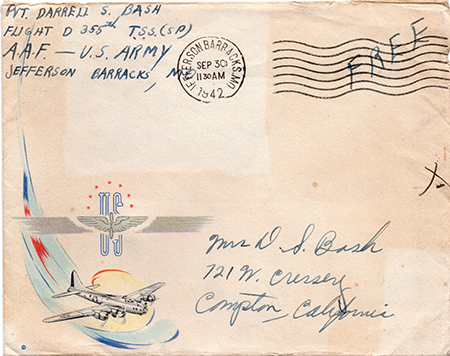
Letter envelope is from training, September 1942 back home to his mother.
He departed San Francisco by ship on Feb 28, 1945 to Guam. The wives were not supposed to know when they were shipping out, but Darrell was able to meet his wife the night before they left San Francisco. After arriving in Guam by ship with the P-51s, he then flew a P-51 from Guam to Tinian on March 23. While waiting for the Marines to secure Iwo Jima he flew 13 P-51 missions on Tinian. D-Day for the Marine invasion of Iwo Jima was on 19 Feb and Iwo Jima was finally secured during Mar/April. During the battle of Iwo Jima U.S. Marines, sailors and soldiers killed an estimated 20,000 Japanese and captured over 1,000 prisoners. On March 25 the Battle of Iwo Jima was declared over and the island secured, although mopping up enemy combatants continued until July.
With Iwo Jima ready for fighter operations, Darrell flew a P-51 to Iwo Jima on May 11. A week later on 18 May 1944, he flew in the first 506th Fighter Group combat mission on a dive bomb and strafing mission on Chichi Jima.
The name of Darrell’s P-51 #616 aircraft was named “Shanghai Lil” which was interestingly also named for the wife (Lil), of Lt Linfante who was the other pilot that flew #616 on Iwo Jima!
Here is a copy of Lt. Bash's Individual Mission Chart. It shows the Mission Number and Date, and breaks down if it was a VLR mission or Short Range mission, as well as Effective vs Non-Effective (Note: Non-effective would be a weather abort for example.) Also it gives his Flight Positions held for the squadron, and lists his aerial victory.
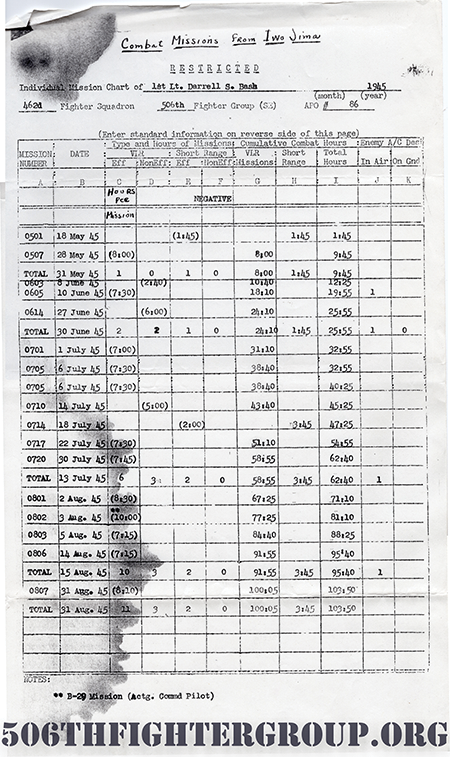
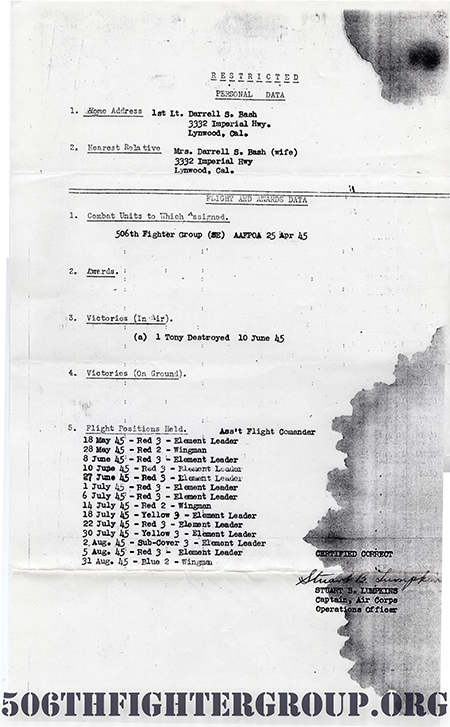
Here is a P-51 taxing, before any of the squadron markings have been applied. Also the Uncle Dog antennas have not yet been installed. With this in mind, the picture is most likely taken on Tinnian rather than Iwo Jima.
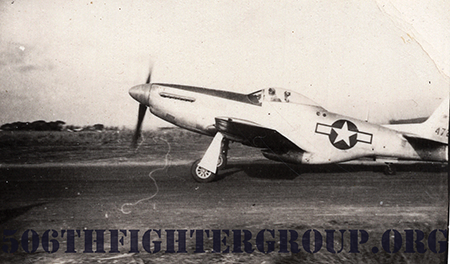
Notice the striped tail, and lack of mission markings and squadron marking. This photo is probably taken on Tinnian.
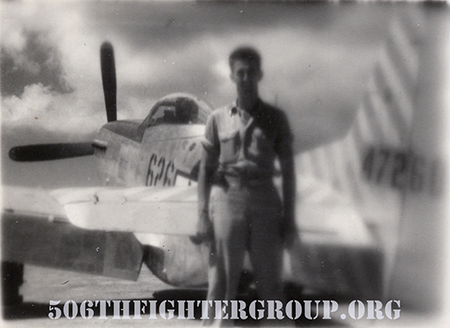
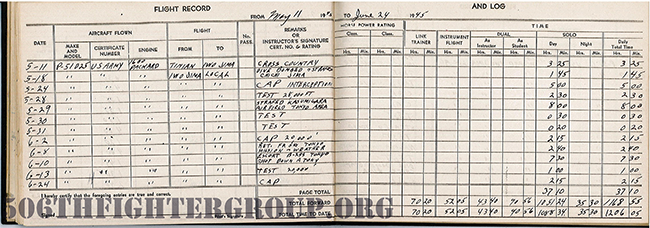
The 21st FG, along with the 15th FG, also flew P-51's from Iwo Jima as part of the VLR missions for the 7th Air Force.
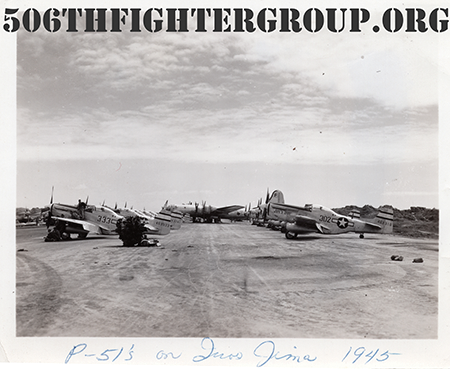
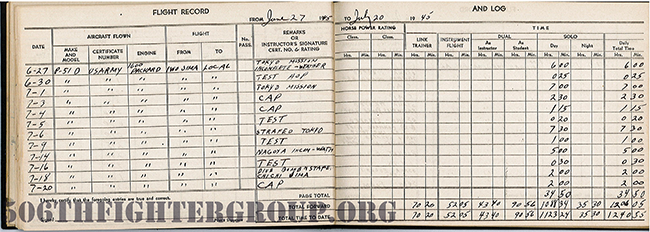
Darrell was credited with one aerial victory over a Japanese Tony on Jun 10, 1945. (See combat film footage for Lt Bash at 1m:06s point of the film.) “On a B-29 escort mission, we encountered enemy fighters at 25,000 feet which resulted in several minutes of intense fighter combat action. My part in the scenario was the destruction of one enemy fighter (Tony) and inflicting damage on another one. I gave chase (hot pursuit) of the damaged aircraft fighter. I was separated from my flight leader (DeJarnette) and also my wingman, who couldn’t keep up with me, due to an un-jettisoned fuel drop tank. My return to realism was to note my position at 4,000 feet over a Yokohama airport, which was the destination of the Japanese fighter I had been chasing. At this time, I heard my flight leader calling for my position; I answered, but got no response. I was getting very lonely being separated from the squadron, my flight leader and my wingman! My last aircraft gun burst was from two outboard guns, which indicated minimum ammunition, left. It was BTTW [balls to the wall] at this point. The U.D. homer assisted me to the B-29 rendezvous point…the squadron had already departed for Iwo Jima. I joined the next B-29 departing for home base and arrived safely with no further problem.” Lt Bash’s final combat mission was a VLR sortie escorting B-29s to bomb Osaka on Aug 13 which was three days after the atomic bombing of Nagasaki and two days before VJ day. He returned from overseas on Sept 21, 1945 to San Francisco.
A somewhat famous picture of P-51D 44-72620, before any markings or the radio upgrades were made.
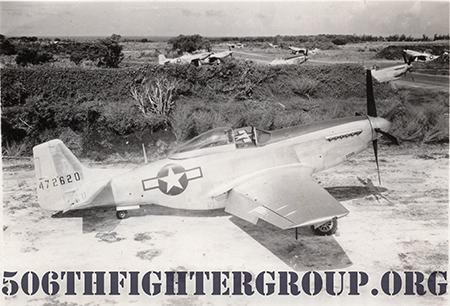
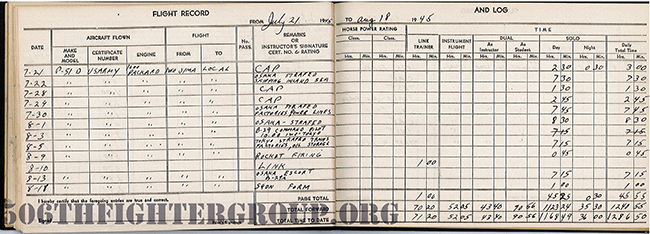
As typical of many WWII veterans, Darrell rarely told war stories. However, there are a few family recollections. P-47 Instructor at Tallahassee. Darrell related that as an RTU instructor he saw first hand the death of several students due to accidents during the strenuous RTU fighter training. In less than four years (December 1941-August 1945), the US Army Air Corps lost 14,903 pilots, aircrew and assorted personnel plus 13,873 airplanes in the continental US. RTU was harrowing time for wives and girl friends but due to this training the quality of US pilots far surpassed that of the enemy. Poker games. The days of boredom between combat missions on Iwo were filled with daily poker games at the Pony Club. At the beginning of the pay period there were several active poker tables and at the end of the month there was only one table left…Darrell was always at that last table as one of the monthly winners. The money he saved was used to start a tire business after the war.
An inflight photo of what appears to be a 21st FG P-51 with drop tanks banking away from the photographer.
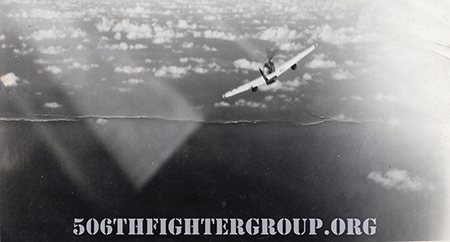
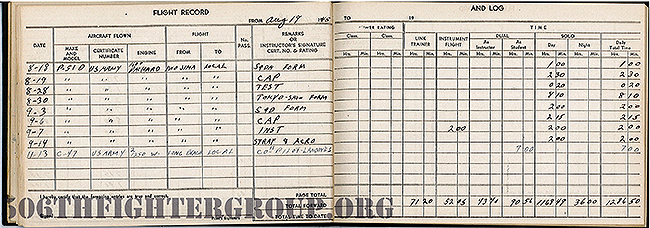
Darrell flew 8 combat missions that involved strafing airfields, factories, oil refineries and shipping, to include a well-known mission on Aug 5 where he was with the flight that strafed a train, factories and oil storage near Tokyo. On another mission on May 29 he was credited with destroying/damaging five aircraft on Kasumigara airfield. “We came in about 450 miles an hour, and I took a shot at two trainers in the middle of the field. I saw my tracers walking right through them. Then I moved up over my flight leader and nosed down slightly to fire into two bombers and a fighter. All three planes were showered with tracers. “ He also told the story that on one strafing mission. He was in the second element and because the enemy was already alerted, the flak was particularly strong. As he came over the airfield boundary he said that the aircraft to his left and right of him in formation were damaged by flak while he flew straight through untouched. (Darrell’s gun camera film posted on this web site show the results of several of these strafing missions)
On one VLR mission returning to Iwo Jima from Japan, the engine of his P-51 started running rough and cutting out. The engine was missing so much that Darrell opened the canopy and was preparing to bailout. At that point the engine started to smooth out and eventually operated normally. The rest of the return flight was uneventful.
During one of his missions Darrell related that he was on the tail of a Japanese aircraft shooting at it when he ran out of ammunition. He pushed up the throttle to fly next to the Japanese aircraft, gave the pilot a salute, and peeled off to fly back to Iwo.
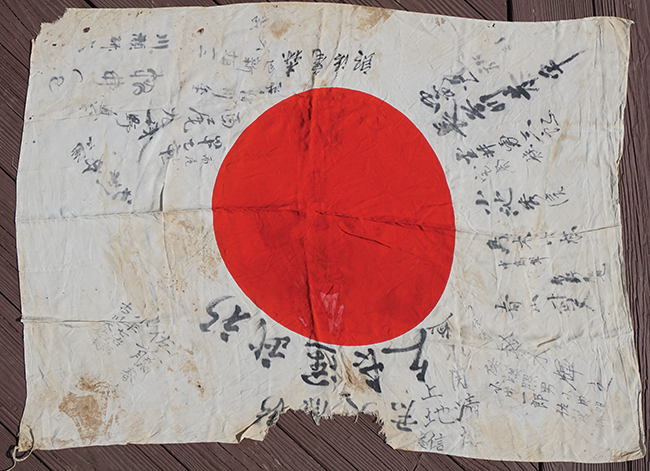
Japanese flag taken from Iwo.
On another mission he damaged a Japanese aircraft, only for it to descend into the clouds and the kill was not confirmed.
On Aug 3 (three days before the atomic bombing of Hiroshima), Darrell flew a 10-hour bombing mission on a B-29 from Iwo Jima to Tokyo as Command Pilot.
On August 30, the pilots were told to fly over Tokyo (8 hours round trip) as a show of force. Unfortunately, there were literally hundreds of aircraft in the sky over Tokyo that day without any altitude or route de-confliction! Japan surrendered (VJ day) on Aug 15 and the peace treaty was signed on the USS Missouri on Sept 2, 1945.
Like millions of other servicemen, Darrell was discharged from the Army Air Corps after the war, which is when he started his tire business. When the USAF was established in 1947 Darrell was offered the opportunity to reenter the Air Force. He eventually retired from the USAF in 1965 as a Lt Col and thousands of hours of flying time. After retirement he purchased a fixed base operation and was the Airport Manager, charter pilot and A&P mechanic at Chester Airport, CA. When Darrell stopped flying after selling the successful FBO, he had accumulated over 17,000 hours of flying time in dozens of different aircraft. His second retirement was in Las Vegas where he became a fixture at the poker tables…and again, just like on Iwo Jima, he was always a winner at the end of every month…as documented in his detailed records.
“Not buying a surplus P-51 in 1946 crated in cosmoline for $1500…but, who had an extra $1500 in 1946?”
An interesting picture of 16 P-51's in formation overhead. Unknown location.
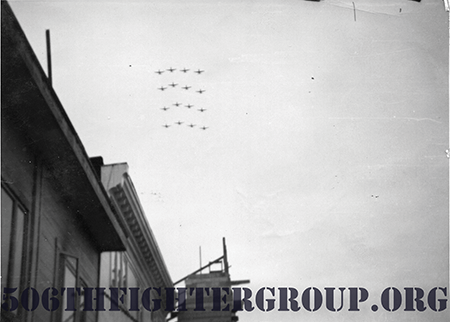
Shanghai Lil, which he shared with Lt. Ed Linfante. Notice the lone kill marking, which belonged to Bash.

Notice Bash's name on the cockpit, as well as the mission markings on the fuselage.
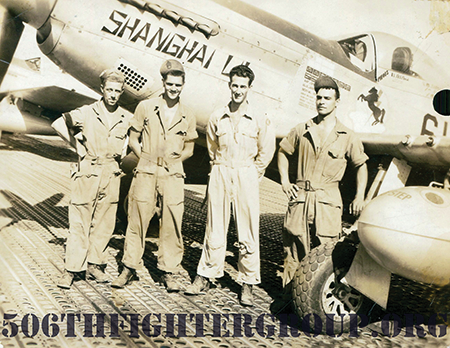
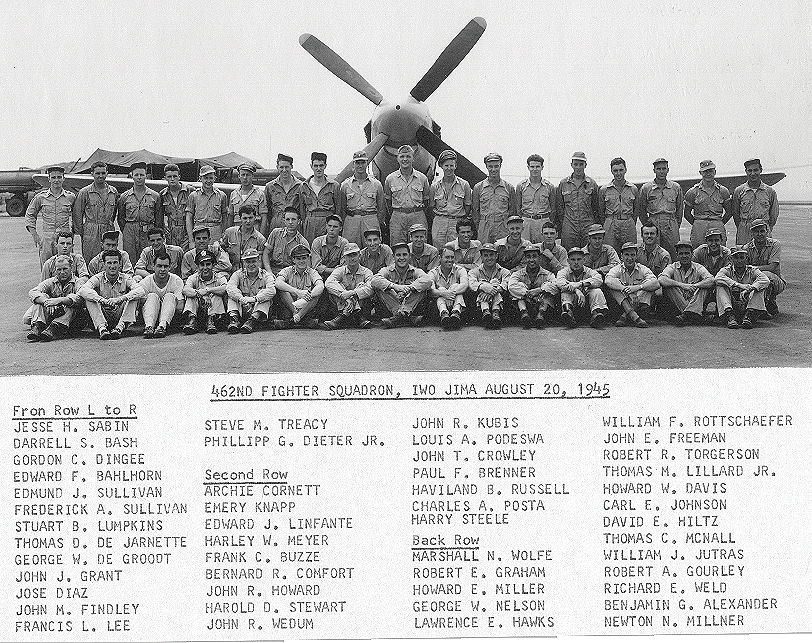
Arrival time: 2/21/2026 at: 5:10:59 PM
Home | Reunions | Contact Us | VLR Story | Mustangs of Iwo Jima | Combat Camera Footage | Battle of Iwo | 457th | Webmaster ©506thFighterGroup.org. All Rights Reserved. |